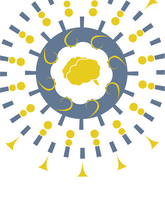This session’s presenters discuss the latest scientific findings on our brain and human perceptual system architecture, and how they might help explain the existence of certain ornamental tropes, such as fractals, in cultures around the world. Ornament will be examined from the perspective of mathematical properties, biophilia and neuroscience. How can ornament help us create architecture more in tune with our neurological needs?
Series:
Ornament’s Refracted Cosmologies
A look at ornament through the lenses of design, science, and culture.
Wed April 7, 14, & 21, 2021
All lectures to be held remotely on Zoom at 6:30 PM EST.
Moderated by Misha Semenov and Kassandra Leiva
Sponsored by Yale School of Architecture, Whitney Humanities Center, and MacMillan Center at Yale
What is the role of ornament in the contemporary built environment? The return of ornament to architectural discourse–and to building facades around the globe–also comes at a time of a vastly expanded scientific understanding of our complex world, from the neural networks that enable our perception and cognition to the vast ecological and cosmological structures we are embedded in. By bringing designers, neuroscientists, ecologists, musicians, and ornament fabricators into conversation with each other, the colloquium aims to lay out a role for ornament in the contemporary built environment as something more than a mere producer of “affect,” as Farshid Moussavi reductively implied in her recent book. We see ornament as a rich language with a deep history that can act as an interdisciplinary intermediary, linking architecture with larger understandings of the world and our place in it. Each of the four lectures explores a different cosmology or system of meaning that ornament has the power to refract and project onto the built environment.
The series is open to Yale students, design professionals, and the broader public; each event will feature the guest lecturers in conversation followed by a general discussion open to all participants on the video call.
Ornament and Neuroscience: Your Brain on Fractals
Event time:
Wednesday, April 14, 2021 - 6:30pm to 7:30pm
Location:
Online ()
Event description:
Richard Taylor, Physics Department Head, University of Oregon & Nikos Salingaros, Professor of Mathematics, University of Texas at San Antonio
Contact:
203-432-2288

